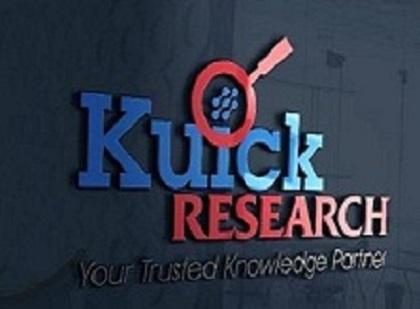Press release
Biomarkers for Predicting Response to TIGIT Antibody Therapy
Identifying biomarkers for predicting response to TIGIT antibody therapy is crucial for optimizing treatment outcomes and personalizing cancer therapy. Biomarkers can help select patients who are most likely to benefit from TIGIT blockade, thereby improving the efficacy and reducing unnecessary exposure to the therapy.Download Report
https://www.kuickresearch.com/report-anti-tigit-antibody-anti-tigit-antibodies-fda-approved-tigit-antibody-tigit-inhibitors-tigit-drugs-approved-tigit-expression-tigit-ligand-tigit-gene
One of the most promising biomarkers for TIGIT antibody therapy is the expression level of CD155, the primary ligand for TIGIT. High levels of CD155 expression in tumors have been associated with better responses to TIGIT blockade. CD155 is often upregulated in various cancers, including non-small cell lung cancer, melanoma, and colorectal cancer. By assessing CD155 expression levels through immunohistochemistry or other molecular techniques, clinicians can identify patients who are more likely to benefit from TIGIT antibody therapy.
In addition to CD155, the overall immune contexture of the tumor microenvironment is a critical factor in predicting response to TIGIT antibodies. Tumors with a high infiltration of effector T cells and NK cells are more likely to respond to TIGIT blockade. These immune cells play a crucial role in mediating the anti-tumor effects of TIGIT antibodies. Therefore, evaluating the presence and activity of these immune cells in the tumor microenvironment can provide valuable insights into the potential efficacy of the therapy.
The co-expression of other immune checkpoints, such as PD-1, PD-L1, and CTLA-4, may also serve as predictive biomarkers for TIGIT antibody therapy. Tumors that express multiple inhibitory receptors are often more resistant to single-agent checkpoint inhibitors. However, they may respond better to combination therapies that target multiple checkpoints simultaneously. By assessing the expression of these markers, clinicians can identify patients who might benefit from combination strategies involving TIGIT antibodies and other immune checkpoint inhibitors.
Genomic and transcriptomic profiling of tumors can further refine the selection of patients for TIGIT antibody therapy. Specific genetic alterations and transcriptional signatures associated with immune evasion and resistance mechanisms can provide additional insights into the likelihood of response. For example, tumors with high mutational burden or certain oncogenic pathways may exhibit distinct immune profiles that are more amenable to TIGIT blockade. Integrating these molecular data with traditional biomarkers can enhance the precision of patient selection.
Furthermore, dynamic biomarkers that reflect changes in the immune response during treatment are gaining attention. Monitoring the levels of soluble TIGIT, CD155, and other immune-related molecules in the blood can provide real-time information about the therapeutic response and potential resistance. These liquid biopsies offer a non-invasive approach to track the effectiveness of TIGIT antibody therapy and adjust treatment strategies accordingly.
The development of companion diagnostics to measure these biomarkers is essential for the clinical implementation of TIGIT antibody therapy. These diagnostics can guide treatment decisions, monitor patient responses, and identify emerging resistance. Collaborations between researchers, clinicians, and diagnostic companies are crucial to advancing the field and bringing these biomarker-driven approaches into routine clinical practice.
In conclusion, identifying biomarkers for predicting response to TIGIT antibody therapy is vital for personalizing treatment and improving outcomes. CD155 expression, immune contexture, co-expression of other checkpoints, genomic and transcriptomic profiles, and dynamic biomarkers all hold promise in guiding patient selection and monitoring therapeutic efficacy. As research progresses and more data becomes available, these biomarkers will play an increasingly important role in the successful implementation of TIGIT antibody therapy in cancer treatment.
KuicK Research
Delhi
India
Kuick Research is a market research and analytics company that provides targeted information for critical decisions at business, product and service levels. We are quick, predictive and known by the recommendations we have made in the past. Our result-oriented research methodology offers understanding of multiple issues in a short period of time and gives us the capability to keep you full with loads of practical ideas. By translating research answers into strategic insight and direction, we not only rate the success potential of your products and/or services, but also help you identify the opportunities for growth in new demographies and find ways to beat competition.
This release was published on openPR.
Permanent link to this press release:
Copy
Please set a link in the press area of your homepage to this press release on openPR. openPR disclaims liability for any content contained in this release.
You can edit or delete your press release Biomarkers for Predicting Response to TIGIT Antibody Therapy here
News-ID: 3628508 • Views: …
More Releases from KuicK Research

Multispecific Antibodies Clinical Trials By Indication Country Company Drug Clas …
Global Multispecific Antibodies Market, Drug Sales, Dosage, Price and Clinical Trials Insight 2030 Report Highlights:
• Global Multispecific Antibodies Market Opportunity By 2030: > USD 50 Billion
• Global Multispecific Antibodies Market Sales In 2024: > USD 12 Billion
• Number Of Approved Multispecific Antibodies: 18
• Global and Regional Trends Insight
• Approved Antibodies Global, Regional, Annual and Quarterly Sales Insight
• Approved Antibodies Dosage and Pricing Insight
• Comprehensive Insight On All Antibodies In Clinical…

Gamma Delta T Cell Cancer Therapy Market Opportunity Clinical Trials Technology …
Global Gamma Delta T Cell Cancer Therapy Market Opportunity and Clinical Trials Insight 2030 Report Conclusions:
• Number Of Gamma Delta T Cell Therapies In Trials: > 30 Therapies
• US & China Dominating Clinical Trials Landscape: > 20 Therapies
• Global Gamma Delta T Cell Therapy Clinical Trials Insight By Company, Country, Indication and Phase
• Gamma Delta T Cell Therapy Future Market Opportunity By Different Cancers
• Insight On Clinical Platforms for Evolving…

US Orphan Drugs Market Sales Clinical Trials Insight 2030
US Orphan Designated Drugs Market Opportunity, Drugs Sales, Price, Dosage and Clinical Trials Insight 2030 Report Offering and Highlights:
• US Orphan Designated Drugs Market Opportunity: > US$ 190 Billion By 2030
• Insight On FDA Designated Orphan Drugs In Clinical Trials: > 850 Orphan Drugs
• Clinical Trials Insight By Company, Indication, Phase and Priority Status
• Insight On FDA Designated Marketed Orphan Drugs: > 500 Orphan Drugs
• Pricing and Dosage Insight: > 400 Marketed Orphan Drugs
• US, Global,…

US Orphan Drug Market Size Forecast 20230
US Orphan Designated Drugs Market Opportunity, Drugs Sales, Price, Dosage and Clinical Trials Insight 2030 Report Offering and Highlights:
• US Orphan Designated Drugs Market Opportunity: > US$ 190 Billion By 2030
• Insight On FDA Designated Orphan Drugs In Clinical Trials: > 850 Orphan Drugs
• Clinical Trials Insight By Company, Indication, Phase and Priority Status
• Insight On FDA Designated Marketed Orphan Drugs: > 500 Orphan Drugs
• Pricing and Dosage Insight: >…
More Releases for TIGIT
Development and Optimization of Next-Generation TIGIT Antibodies
The development and optimization of next-generation TIGIT antibodies represent a significant advancement in cancer immunotherapy. These antibodies are designed to target the TIGIT immune checkpoint more effectively, offering improved therapeutic potential for enhancing anti-tumor immune responses.
Download Report
https://www.kuickresearch.com/report-anti-tigit-antibody-anti-tigit-antibodies-fda-approved-tigit-antibody-tigit-inhibitors-tigit-drugs-approved-tigit-expression-tigit-ligand-tigit-gene
The initial development of TIGIT antibodies focused on blocking the interaction between TIGIT and its ligands, CD155 and CD112. By preventing this binding, the inhibitory signals transmitted by TIGIT are lifted, allowing immune cells…
The Future of TIGIT Antibodies in Personalized Cancer Treatment
The future of TIGIT antibodies in personalized cancer treatment looks promising, with the potential to revolutionize the way we approach cancer therapy. Personalized medicine aims to tailor treatments based on individual patient characteristics, including genetic, molecular, and immune profiles. TIGIT antibodies, by targeting a specific immune checkpoint, offer a new avenue for customizing cancer treatment and improving patient outcomes.
Download Report
https://www.kuickresearch.com/report-anti-tigit-antibody-anti-tigit-antibodies-fda-approved-tigit-antibody-tigit-inhibitors-tigit-drugs-approved-tigit-expression-tigit-ligand-tigit-gene
TIGIT, an inhibitory receptor expressed on T cells, NK cells, and…
Comparative Effectiveness of TIGIT Antibodies and Other Checkpoint Inhibitors
The comparative effectiveness of TIGIT antibodies and other checkpoint inhibitors is a topic of significant interest in the field of cancer immunotherapy. Immune checkpoint inhibitors have revolutionized cancer treatment by unleashing the immune system's ability to attack tumors. While PD-1 and CTLA-4 inhibitors have shown remarkable success, TIGIT antibodies offer a new approach with potentially complementary mechanisms.
Download Report
https://www.kuickresearch.com/report-anti-tigit-antibody-anti-tigit-antibodies-fda-approved-tigit-antibody-tigit-inhibitors-tigit-drugs-approved-tigit-expression-tigit-ligand-tigit-gene
PD-1 inhibitors, such as pembrolizumab and nivolumab, block the PD-1 receptor on T…
Innovations in Immunotherapy The Rise of Anti TIGIT Antibodies
Innovations in immunotherapy have transformed the landscape of cancer treatment, offering new hope to patients who previously had limited options. Among these innovations, the rise of anti-TIGIT antibodies represents a significant advancement in the field, providing a novel approach to enhancing the immune system's ability to combat cancer. Anti-TIGIT antibodies are a new class of immune checkpoint inhibitors that target TIGIT, an inhibitory receptor expressed on T-cells, natural killer (NK)…
Anti TIGIT Antibodies Revolutionizing Immunotherapy
Anti-TIGIT antibodies are at the forefront of a revolution in immunotherapy, representing a new class of immune checkpoint inhibitors that have the potential to transform the treatment landscape for cancer. Immunotherapy, which harnesses the body's immune system to fight cancer, has already made significant strides with the introduction of PD-1, PD-L1, and CTLA-4 inhibitors. However, the discovery and development of anti-TIGIT antibodies add a new dimension to this field, offering…
Advancements in Anti TIGIT Antibodies for Tumor Treatment
Advancements in anti-TIGIT antibodies have brought new hope to the field of tumor treatment, offering innovative approaches to harnessing the body's immune system against cancer. TIGIT, an inhibitory receptor found on immune cells, plays a crucial role in dampening immune responses, which can be particularly problematic in cancer, where a robust immune response is essential for targeting and destroying tumor cells. Anti-TIGIT antibodies work by blocking this inhibitory pathway, thereby…
